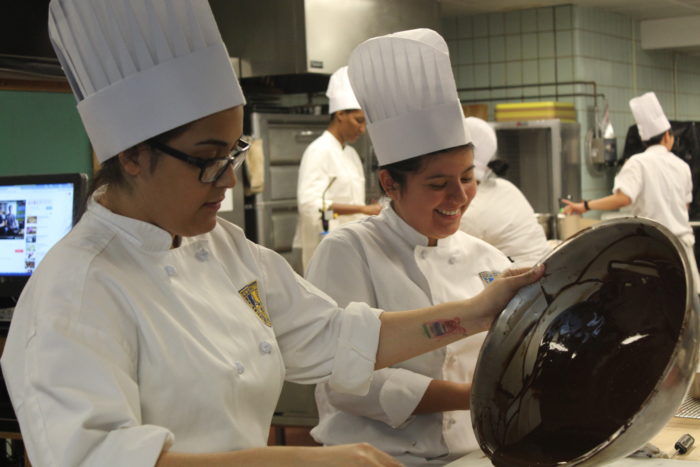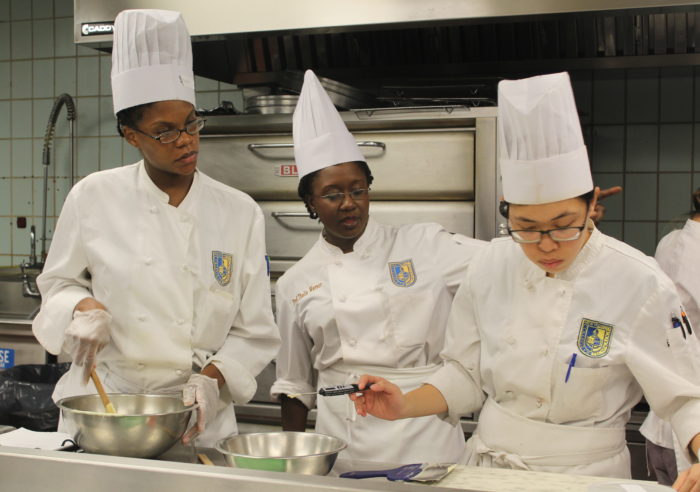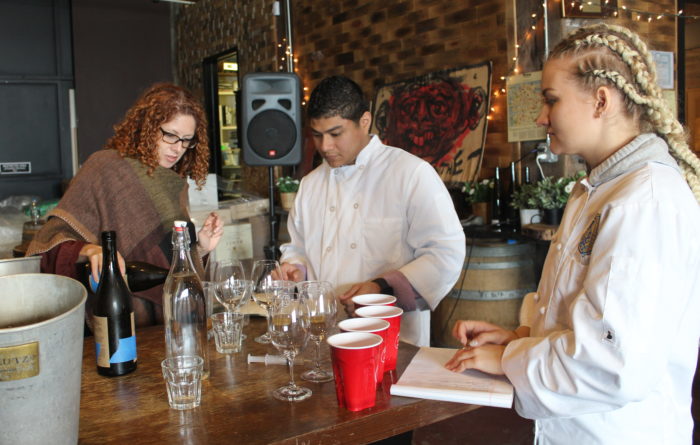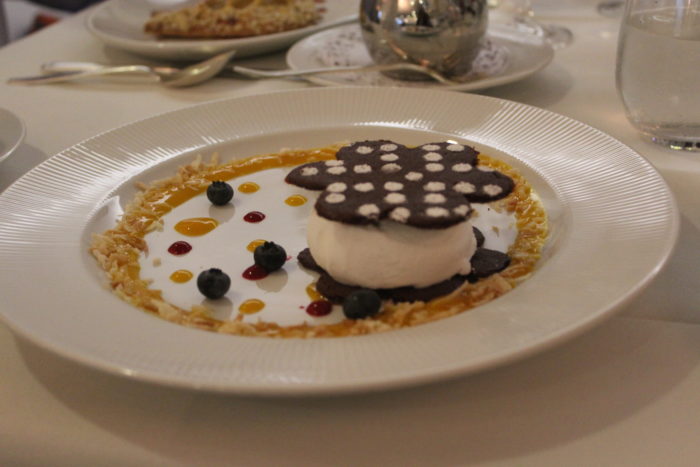The College Where Students Get to Taste Their Work
The chef of your next trendy meal may be a graduate of Brooklyn's City Tech, where Hospitality Management is a thriving career choice
Students at City Tech making chocolate bark in the Candies and Bonbons class (Photos by Arden Phillips)
On a recent school day just before the holidays, a class of college students in Downtown Brooklyn was studiously making a batch of chocolate bark. Not on a whim, but as a serious academic pursuit. The students mixed their chocolate, poured it onto a baking sheet, and sprinkled on such toppings as peppermint fragments and fruit, while Professor Thalia Warner watched closely.
The formal name of this class is HMGT 4977, Candies and Bonbons, where students also learn to make peanut-butter cups, nougat, turkish delight and truffles. One of them, Juane St. Brice, a senior, found the class “extremely insightful and fun. The best part about learning new techniques and executing new recipes,” she added, “was the sugar rush after.”
Candies and Bonbons is surely the sweetest of more than 50 classes offered by the Department of Hospitality Management, a thriving degree program at the New York City College of Technology, the Brooklyn-based CUNY branch known popularly as City Tech. On their path to either an associate or bachelor’s degree, students dive into subjects ranging from the art of vegetarian cuisine to sustainable tourism.

Professor Thalia Warner, center, guides City Tech students in their Candies and Bonbons class
The department, whose enrollment has grown from about 650 a decade ago to as many as 900 today, is in a prime position to feed its graduates into Brooklyn’s booming hospitality business. A recent report on the borough’s economy for the Brooklyn Chamber of Commerce said employment in the tourism-and-entertainment category has grown “at an astounding 9.9% per year since 2012,” adding nearly 16,900 net new jobs. Thanks to a recent building boom, Brooklyn now has dozens of new hotels, including the trendy 1 Hotel Brooklyn Bridge and an outpost of the Hilton chain.
Many of City Tech’s hospitality graduates have gone on to prominent industry positions, notably chef and author Michael Lomonaco, owner of Manhattan’s Porter House Bar and Grill, and Feliberto Estevez, executive chef at Gracie Manor. One current student, Mimi Chen, was recently selected to partner with renowned chef Matthew Kirkley as the U.S. team in the prestigious Bocuse d’Or, the biennial world chef championship. “Mimi’s talent is a fine match for her desire to take risks,” Karen Goodlad, an assistant professor at the school, told The Bridge. “The competitions she has prepared for at such a young age truly need a person who can handle the stress. I think many great things are ahead for her.”
Yet even those graduates who don’t find fame are nearly a lock to win another valuable prize: a job in their field. “Throw a rock in any New York kitchen”–or perhaps more safely, a dinner roll–“and you’ll hit a City Tech graduate,” says Stephen Soiffer, a special assistant to City Tech’s president. The hospitality-department chair is industry veteran Elizabeth Schaible, whose academic research has included the study of tearoom-management schools in early 20th-century New York City.

Assistant professor Karen Goodlad, left, teaches Wines of the World at Red Hook Winery
As part of the curriculum, Hospitality Management students frequently venture into the field. For the school’s new Wines of the New World course, supported by a grant from the Julia Child Foundation, students attend class at Red Hook Winery, where they learn how to blend wines, partake in wine tastings, and practice pairing the wines with meals. In one recent class, taught by professor Goodlad, the students tasted wine taken directly from a variety of barrels. (In traditional wine-tasting fashion, they take a sip of the wine, swirl it in their mouth, and then spit it out.)
When resident winemaker Christopher Nicolson opened up one of the barrels, the students observed a large raft of grapes floating on top. Goodlad looked to the class and asked, “Why is it that all of the fruit is up at the top?” After just a moment, a student spoke up, explaining that the carbon dioxide created through fermentation caused the fruit to rise.
The class goes deep into the intricacies of wine-making, starting with the vineyard. “The aim is to draw attention to individual properties and individual varieties. All of the choices that you make in wine-making matter,” says Snyder. From what they’ve learned, the students practice writing “shelf talkers,” those little signs in the wine shop that tell shoppers about the wine type, flavor notes and food pairings.
The students practice blending wines as well, which they sample in a blind taste test. Some of the blends they create are chosen to be bottled and served in the City Tech formal dining room. Recent bottlings include “Dark Aroma,” a red-wine blend created by students Lynce Milien and Ameera McGaney, and “V&V,” a white wine by students Victoria Mustacchio and Veronica Kirschner.

A very fancy take on the ice-cream sandwich is presented in the Janet Lefler Dining Room
The Janet Lefler Dining Room, named for one of the department’s early instructors, is where it all comes together. The dining room is essentially a practice stage that resembles a fancy restaurant, with white tablecloths, a multi-course menu, and a crisply dressed staff of students playing all the roles in a real restaurant. Each student waiter has detailed knowledge of the menu, which changes daily. Most of the customers are faculty and visitors.
Overall, City Tech takes pride in its role as a path to careers for the offspring of low-income and immigrant families. Nearly 90% of its enrollment are students of color and 35% were born outside the U.S., making the tech school the most diverse of its kind in the U.S. Sixty-one percent of students report household income of less than $30,000. The college’s enrollment this school year is more than 17,000, up 50% over the past dozen years. With technology industries booming, the school has expanded rapidly to accommodate the demand for enrollment.
In the semester before they graduate, Hospitality Management students head out into the world for internships tailored to their particular focus, which could be anything from baking to resort management. By that point, many students have figured out what part of the business they prefer. (“Students come in and think that they want to be chefs and then realize, ‘Oh, I have to stand for four hours? Nope!’,” says Soiffer.) Many of the students find internships at food purveyors in the Brooklyn Navy Yard, which is expected next year to be the site of a new supermarket from the popular Wegmans chain, providing even more potential opportunities.










